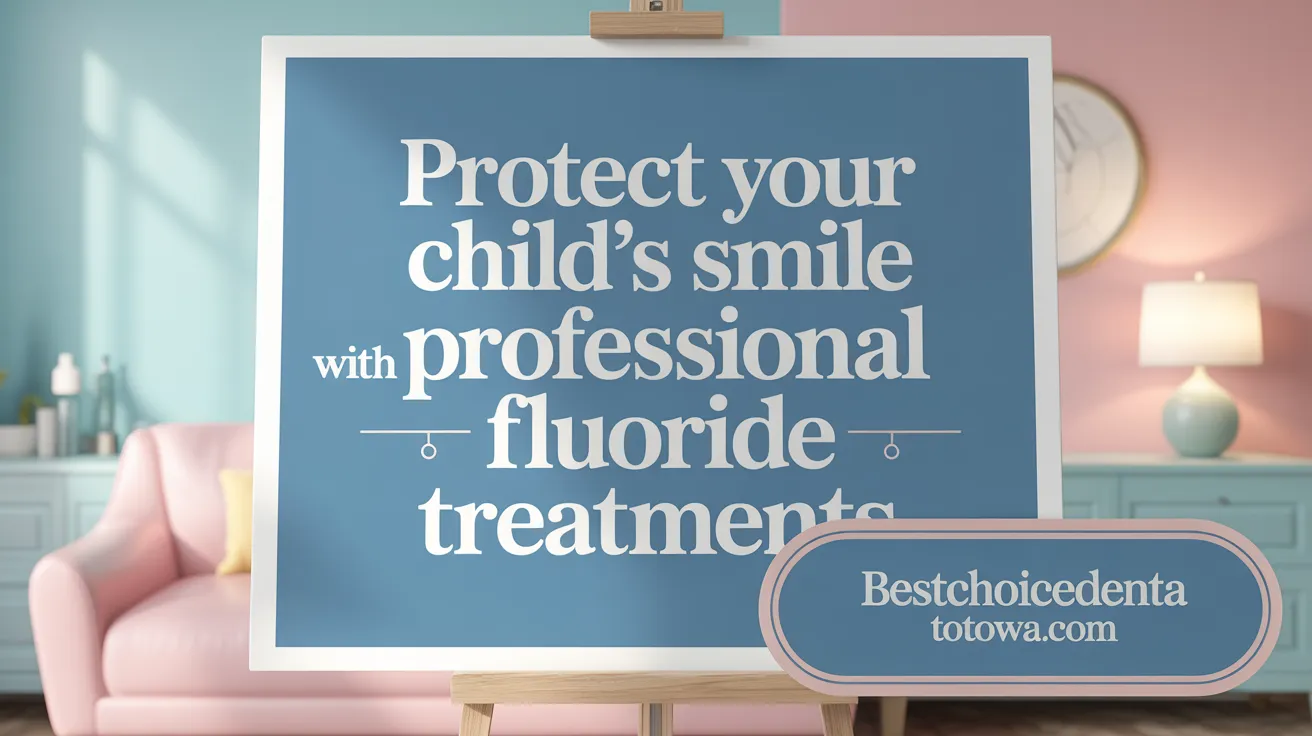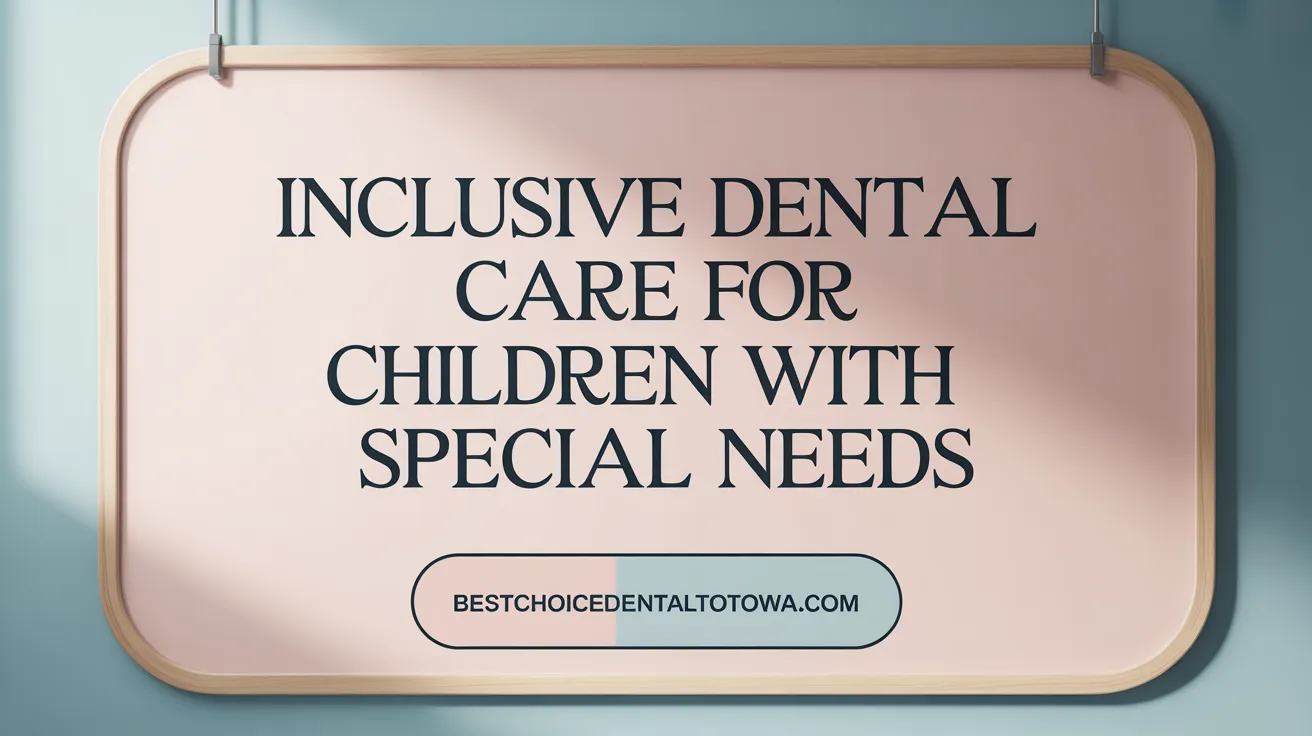Introduction to Pediatric Dentistry for Healthy Children's Teeth
The Importance of Pediatric Dentistry
Pediatric dentistry is dedicated to the oral health of children from infancy through adolescence. It plays a crucial role in maintaining healthy teeth, preventing dental issues, and ensuring positive dental experiences for children.
Early Dental Visits
Experts recommend that a child’s first dental visit occur by their first birthday or within six months of their first tooth erupting. Early visits help children become comfortable with dental care, catch potential issues early, and educate parents on proper dental hygiene.
Overview of Preventive Dental Care
Preventive measures include regular dental check-ups, professional cleanings, fluoride treatments, and the application of dental sealants. These practices protect young teeth from decay and promote lifelong oral health habits.
Key Facts on Children's Dental Health and Preventive Care
- Children should have their first dental visit by age one or when their first tooth appears.
- Establishing good home care habits like brushing twice daily with fluoride toothpaste is essential for kids.
- Professional fluoride treatments help strengthen enamel and prevent cavities, reducing decay risk in children.
- Applying dental sealants to molars and premolars can reduce cavity risk by up to 80% in children.
- Regular dental checkups every six months allow early detection of problems and professional cleanings to prevent decay.
- Pediatric dentists create child-friendly environments to reduce anxiety and foster positive dental experiences.
- Monitoring jaw and teeth development helps identify early signs of misalignment or malocclusion for timely intervention.
- A balanced diet with limited sugary snacks and drinks supports children's dental health and enamel strength.
- Practices with ADA-compliant facilities offer accessible, inclusive care for children with special needs.
- Family-oriented dental practices offer comprehensive services, including preventive, restorative, and orthodontic care** to serve all ages.
1. Early Dental Visits by the First Birthday

When should a child have their first dental visit?
Children should have their first dental visit when their first tooth appears or by their first birthday. This early appointment plays a crucial role in detecting potential dental issues before they become more serious, as highlighted in the First dental visit recommendations, First dentist visit recommendations, and Dental visit by first birthday.
An initial dental visit also helps children become comfortable with the dental environment. Pediatric practices often create a welcoming, non-threatening atmosphere that helps reduce anxiety and fear associated with dental visits, as described by Pediatric Dentistry & Orthodontics of Midland Park and Friendly pediatric dental care.
Early dental visits also provide opportunities for dental professionals to guide parents on proper home care and preventive measures such as fluoride treatments and dietary advice. This proactive approach can prevent cavities and other oral health problems, supported by Benefits of fluoride treatments, Fluoride varnish benefits, and Preventing tooth decay.
Starting dental care early supports a positive dental experience and establishes a foundation for lifelong healthy habits. Regular check-ups every six months following the first visit ensure ongoing monitoring of dental development and early detection of any problems, as recommended by Importance of regular dental check-ups and Regular dental visits for children.
By prioritizing the first dental visit by age one, families in communities like Totowa, New Jersey, can ensure their children's oral health is well protected from the start, supported by resources like Dental visit by first birthday and First dental visit advice in Totowa.
2. Establishing Good Home Oral Hygiene Habits

What home care habits are important for maintaining children's dental health?
Good home care habits form the foundation of children's dental health. Brushing teeth twice daily with fluoride toothpaste is essential, as fluoride strengthens tooth enamel and helps prevent cavities. For children under six, parents should supervise brushing to ensure the right amount of toothpaste is used and proper technique is followed.
Flossing is also important once children's teeth begin to touch, which helps remove plaque between teeth and prevents gum disease. Parents should assist with flossing until children develop the manual dexterity to do it effectively on their own, usually around age 7 or 8.
A healthy diet supports oral health by limiting sugary snacks and drinks that contribute to tooth decay. Encouraging consumption of nutritious foods such as fruits, vegetables, dairy products, and water helps maintain strong teeth and overall well-being.
Establishing these habits early promotes lifelong dental health and reduces the risk of cavities and other oral health issues in children. For more detailed guidance on good dental habits for children and preventing cavities in children, see these resources.
3. Professional Fluoride Treatments to Strengthen Enamel

How do fluoride treatments help children's dental health?
Fluoride plays a crucial role in preventing tooth decay by strengthening the enamel, which is the hard, protective outer layer of teeth. This makes teeth more resistant to the acids produced by bacteria that cause cavities. Learn more about the benefits of fluoride treatments and how they help in preventing cavities in children.
Professional fluoride varnish is commonly applied during dental visits, often starting as soon as the child's first tooth erupts. This treatment can reduce the risk of cavities by about 33% in primary teeth, providing extra protection beyond daily brushing. See recommendations for fluoride varnish application and early dental visits.
In addition to varnish applications, fluoride is also commonly added to community drinking water. This fluoridation helps maintain overall enamel strength and reduce decay at a population level. Drinking fluoridated tap water, along with regular dental care and good home oral hygiene, supports children’s dental health effectively. Discover the impact of community fluoridation and the importance of daily brushing with fluoride toothpaste.
Together, these fluoride treatments form an essential line of defense in preventive dentistry in children, helping children maintain strong, healthy teeth. For more on comprehensive pediatric dental care, visit specialized pediatric dentistry for children.
4. Dental Sealants as a Preventive Measure

What is the role of dental sealants in children's oral care?
Dental sealants serve as a crucial preventive treatment in children's dentistry. They are thin, protective coatings applied primarily to the chewing surfaces of back teeth—namely molars and premolars. These teeth have deep grooves that can trap food and bacteria, making them vulnerable to cavities. Dental sealants for cavity prevention
Applying sealants is a quick and painless procedure performed during routine dental visits. The sealant material bonds to the enamel, creating a smooth surface that is easier to clean and less likely to harbor decay-causing bacteria. Dental sealants for cavity prevention
Dental sealants have been shown to reduce the risk of cavities by up to 80%, providing a long-lasting shield against tooth decay. This makes them an essential part of maintaining healthy teeth in children, complementing daily brushing, flossing, and fluoride treatments. Dental Sealants to Prevent Cavities
By focusing on molars and premolars—where decay is most common—sealants effectively protect the teeth that are hardest for children to clean thoroughly, supporting overall oral health and minimizing the need for restorative dental procedures. Dental Sealants and Fluoride Treatments
5. Routine Professional Dental Checkups and Cleanings
Why are regular dental checkups crucial for children?
Regular dental visits every six months are essential for maintaining children's oral health services. These checkups allow dentists to identify any emerging issues early, such as cavities or gum problems, before they become severe. Early detection helps avoid more complex treatments and ensures children's teeth develop healthily.
Frequency of Visits
Children should begin visiting the dentist by their first dental visit recommendations or within six months of their first tooth erupting. After this initial visit, scheduling appointments every six months is recommended to keep track of growth, monitor oral health, and reinforce good hygiene habits.
Professional Teeth Cleaning
During checkups, professional teeth cleanings remove plaque and tartar buildup that daily brushing and flossing might miss. This helps prevent cavities in children and gum disease. Cleanings also polish teeth, contributing to a healthy smile and fresh breath.
Early Issue Identification
Regular exams enable dentists to catch early signs of dental problems such as cavities or misaligned teeth. Detecting issues early permits timely intervention, reducing pain and preventing complications that could affect eating, speaking, and overall well-being. These early interventions align with preventive dentistry in children.
Parental Guidance
Dental professionals provide valuable guidance to parents, advising on brushing techniques, fluoride use, dietary choices, and preventive measures like dental sealants for cavity prevention and benefits of fluoride treatments. This partnership helps families establish and maintain effective home care routines, supporting lifelong oral health for children in Totowa and beyond.
6. Child-Friendly Dental Environments and Anxiety Management

How do pediatric dentists help reduce dental anxiety in children?
Pediatric dentists focus on creating a welcoming and fun atmosphere that feels safe and non-threatening to young patients. They use kid-friendly language and avoid words that might cause fear or distress during visits.
Behavior management strategies in pediatric dentistry, including gentle guidance and positive reinforcement, help children feel at ease. These pediatric dental anxiety management techniques support stress-free experiences, promoting positive associations with dental care. Learn more about reducing dental anxiety in children.
By fostering a trusting, enjoyable environment, pediatric dentists play a crucial role in preventing dental phobia, which can persist if not addressed early. This approach ensures children grow up confident and comfortable with regular dental visits. For further information, see Preventing dental phobias and friendly pediatric dental care.
7. Monitoring Growth and Early Orthodontic Evaluations

How is jaw and teeth development monitored in children?
Pediatric dentists track the growth of a child's jaws and teeth from infancy through adolescence. Regular dental visits allow specialists in Totowa, NJ, and beyond to observe changes and identify any issues early. Maintaining a timeline of tooth eruption and alignment helps ensure that developmental milestones are met, supporting proper chewing, speech, and overall oral health.
Why is early detection of malocclusion important?
Malocclusion, or misalignment of teeth and jaws, can affect a child’s appearance, oral function, and self-esteem. Early orthodontic evaluations allow dentists to recognize these problems in their initial stages. Detecting malocclusion early often simplifies treatment, reduces the need for complex procedures later, and boosts confidence by preserving a positive self-image. Learn more about orthodontic treatments for children.
How do space maintainers and orthodontic appliances assist children?
When primary teeth are lost prematurely, space maintainers help preserve the correct spacing for permanent teeth. Orthodontic appliances such as braces and Invisalign options can then correct alignment issues as the child's mouth develops. Pediatric dental practices in Totowa and surrounding areas provide these specialized treatments, ensuring comprehensive care tailored to each child's needs.
8. Nutritional Guidance for Supporting Dental Health

How Does Diet Impact Children's Oral Health?
Diet plays a crucial role in maintaining children's dental health services. Nutritious foods like vegetables, fruits, dairy, and lean proteins provide essential vitamins and minerals that support strong teeth and healthy gums. Calcium from milk, cheese, and yogurt helps build strong enamel, while a balanced diet supports overall oral development.
Why Is It Important to Limit Sugary Snacks and Drinks?
Frequent consumption of sugary snacks and drinks increases acid production in the mouth, leading to tooth decay and cavities. Limiting sweets, sodas, and fruit juices — especially those served in bottles or sippy cups — helps reduce this risk. Avoiding habitual nighttime bottles with milk or juice also prevents prolonged sugar exposure that can cause decay.
How Can Water and Milk Consumption Benefit Children's Teeth?
Encouraging children to drink fluoridated tap water and milk between meals helps protect teeth by washing away food particles and neutralizing acids. Water is especially beneficial as it hydrates and contains fluoride, which strengthens enamel and prevents decay (Fluoride varnish benefits). Milk provides calcium and other nutrients vital to tooth development.
By combining nutritious meals, limiting sugary intake, and promoting water and milk consumption, parents can support their children's long-term dental health effectively.
9. Inclusive and Specialized Care for Children with Special Needs

ADA-Compliant Facilities for Accessibility
Modern pediatric dental practices, such as Pediatric Dentistry & Orthodontics of Midland Park, prioritize ADA compliance to ensure their facilities are fully accessible to children with special needs. These features provide safe, barrier-free environments, making dental visits comfortable and stress-free.
Tailored Treatment Approaches
Pediatric dentists receive specialized training to address the unique dental requirements of children with special health care needs. This includes adapting communication techniques, using behavior management strategies in pediatric dentistry, and providing individualized care plans that accommodate each child's specific circumstances (Specialized Pediatric Dental Care).
Ensuring Accessibility and Comfort
Inclusion is foundational to quality pediatric dental care. Practices incorporate flexible scheduling, gentle examination techniques, and supportive staff to ease anxiety and create a welcoming atmosphere. These efforts focus on fostering positive dental experiences that encourage lifelong oral health habits in children with diverse needs (Reducing Dental Anxiety in Children, Preventive dentistry in children, pediatric dental anxiety management techniques.
Modern Services Offered by Family-Oriented Dental Practices
What types of modern oral healthcare services does a family-oriented dental practice typically offer?
Family-oriented dental practices provide a broad spectrum of dental services designed to care for patients of all ages in a comfortable and friendly environment. They focus on comprehensive preventive dental care for kids, which includes professional teeth cleanings, fluoride treatments to strengthen enamel, and protective dental sealants that help reduce the risk of cavities.
In addition to preventive services, these practices offer restorative care such as composite fillings for kids, porcelain crowns for children, and pediatric root canal therapy to address decay, injury, or other dental issues. Cosmetic treatments such as professional teeth whitening improve mild aesthetic concerns, enhancing patients’ smiles.
Orthodontic services are also commonly available, with options ranging from traditional braces to modern clear aligners like Invisalign. These treatments help in correcting bite issues, aligning teeth properly, and supporting overall oral health. Many family practices have orthodontic treatments for children including braces and Invisalign options.
Most family dental offices incorporate the latest dental technology—including digital X-rays, intraoral cameras, and comfortable sedation techniques—to provide accurate diagnoses and painless procedures. This integration of advanced tools ensures personalized and effective care tailored to each patient’s needs, making dental visits stress-free and beneficial for the entire family.
Building Lifelong Healthy Dental Habits for Children
Importance of Early Care
Starting dental care from the first tooth or by the first birthday sets a strong foundation. Early visits help children become comfortable with dental routines and allow for early detection of potential issues.
Commitment to Preventive Practices
Regular cleanings, fluoride treatments, and dental sealants effectively reduce cavities. Fluoride strengthens enamel, while sealants protect hard-to-clean molars, preventing decay in children.
Collaborative Role of Dentists and Parents
Pediatric dentists provide expert guidance tailored to children’s needs, while parents support daily brushing and flossing habits, supervise fluoride toothpaste use, and encourage healthy diets. Together, they ensure children enjoy positive, lifelong oral health.
